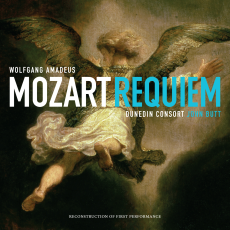Dunedin Consort - Mozart: Requiem - Huffington Post
Classical Music on Vinyl - Like Sex For the First Time
New classical vinyl pressed from pre-digital, analogue recordings may be fighting a losing battle. Sales are not spectacular - non-classical vinyl has caught on big in an entirely different, not just for audiophiles, hands-on way. But the thrill of hearing a new LP for the first time is still there. And they do link the major companies to a time when the recording art was at its best. Which is a good thing, because even though music on any medium is about sex, on vinyl it was always about sex for the first time.
If you fancy the experience, there's still lots of vinyl from the good old days available at shops like Record Surplus in West LA and the internet. There are three possible issues with both used and mint LPs.
1. If they were well-maintained and played only once a day, an urban myth has it that vinyl can last for 99 years.
2. Major markets had their own mastering characteristics; US designed to sound good on highly-colored acoustic reflex speakers, UK on BBC 3/5A and Quad electrostatic models.
3. Pressing quality. English was the best, French (until the late 1970s) was the worst.
If you have the bread, brand new vinyl in the form of heavyweight 180g pressings by Europe's finest plants of analogue and early digital recordings, can sound awesome and are priced accordingly. They are not immune to surface noise so buy from a reputable dealer. If you want to be zen about it, follow the advice of legendary Sonic Arts producer Leo Kulke who played new vinyls once "to knock off the edges" and then cleaned them on a professional vinyl cleaning machine.
Mozart Requiem - the first performance - the Dunedin Consort - Linn 180gm Vinyl
Audiophile icon Linn Records' new recording of Mozart's Requiem reimagines what Mozart's most celebrated sacred work may have sounded like at its very first performance at St. Michael's Church in Vienna in 1792. The expressive power that results from scrupulous, hi-def scholarly attention to detail gives the players total fluency with the musical narrative, with marvelous brass work including a trombone solo by Philip Dale that almost steals the show. The four soloists are ideally balanced, and since they also form part of the chorus, the vocal/choral flow is seamless.
The ironic thing is that this iconic Catholic Church mass receive one of its most sumptuous recordings in aesthetically incongruous (but acoustically resplendent) Greyfriar's Kirk in Edinburgh, the very antithesis of an Austrian Baroque church or cathedral.
The pressing by Pallas is a big part of the story. While the sound on the corresponding CD or hi-def download are prime Linn, the vinyl is something else, with a presence that says analogue. On the CD you get three extra tracks, Mozart's "Misericordias Domini, K. 222," which may have been performed at the same church during the last year of Mozart's life, plus alternate readings of the opening Introit and the "Kyrie Eleison.") In addition to all the other goodies, conductor John Butt's liner note is a model of absorbing, relevant information delivered as if it were a New Yorker story.


